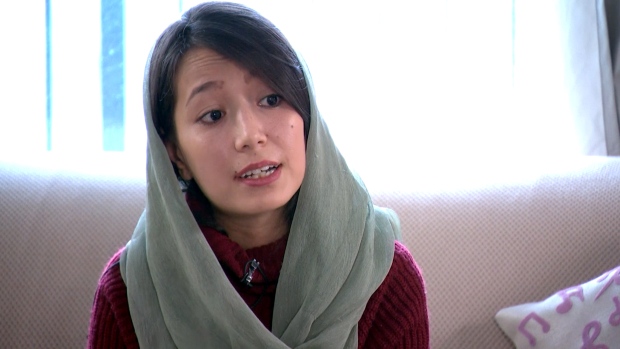SASKATOON, SASK. —
Dozens of Afghan women are elated to be experiencing their first Canadian winter after a harrowing journey escaping Afghanistan, where they faced retaliation for their work in education.
About 200 Afghan women and their families began arriving in Saskatoon, Sask., as refugees in September after fleeing the Taliban for a better life in Canada. They are all students and graduates of the Marefat School in Kabul, which champions education for women, especially those of the Hazaras ethnic minority — two factors that made them early targets for the Taliban.
Maryam Masoomi is among these women now calling Saskatoon home.
“When the Taliban took Kabul, I just died and my dreams were gone,” she told CTV National News.
Marefat School is still open today, but now it’s only for boys.
Masoomi, also a talented singer, also feared that the Taliban would also uncover YouTube videos of her singing in school, given the group had banned music.
“I just feel that they will kill us,” she said.
When the Taliban took over the Afghan capital in August, she knew she had to get out as soon as possible.
“It was very shocking news for everybody,” she said. “Everyone was in a hurry and chaos had begun.”
A few days after fleeing her home, Masoomi was able to secure a Canadian visa. She drove 12 hours to Mazar-i-Sharif, a city in northern Afghanistan. But she couldn’t find a flight out of country for two weeks and eventually returned to Kabul.
From there, Masoomi and her group took a four-hour journey to Jalalabad, west of Kabul, and then two-and-a-half hours to the border with Pakistan where they crossed over.
“That was so scary a moment,” she said. “I was just crying.”
Once in the neighbouring country, it took another month before she was able to fly into Canada.
Farkhonda Tahery also went to Marefat School and is now settled in Saskatchewan. She was one of the first Afghans to arrive in the city back in September.
Tahery said she called her parents as the flight was about to take off to let them know she had escaped.
“It was difficult, honestly,” he said. “They were happy because they knew that we were going to be safe.”
She had spent time in a Pakistani hostel and frequently thinks back to those still stuck there, dozens of whom face sexual slavery if they’re sent back to Afghanistan.
“That’s a high risk that they’re going to be taken and sold as slaves,” she said.
More than 100 Afghan refugees remain at the hostel in potentially dangerous circumstances. Several charities have tried to push the Canadian government to speed up the immigration process for these people, but the government is not committing.
CTV News has learned that Malala Yousafzai, a Pakistani advocate for women’s rights and a Nobel Peace Prize laureate, is lending her name to the cause.
The Canadian government has promised to resettle 40,000 Afghan refugees, but there is no timeline for doing so. So far, the government has been able to bring in 6,495 refugees through the three streams, according to government numbers.
Immigration, Refugees and Citizenship Canada has received 14,720 applications from Afghans who helped the Canadian military in the Afghanistan War.
Masoomi also worries about the other Afghan refugees who remain in precarious situations, but hopes to be part of the solution in the future.
“In Afghanistan, [the refugees] will not have any future,” she said.
“I want to be a good leader and I want to participate in Parliament and helping the Saskatchewan and Saskatoon people.”



















Discussion about this post